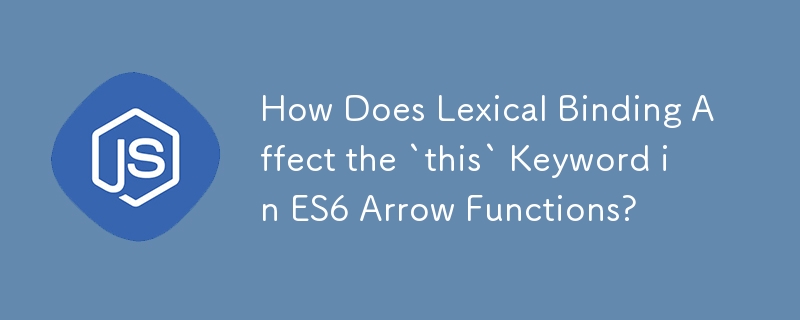

In the realm of JavaScript, arrow functions introduce a subtle yet impactful change in how the "this" keyword behaves. Unlike traditional function declarations, arrow functions exhibit lexical binding, a concept that governs the value of "this" within their scope.
What is Lexical Binding?
Lexical binding refers to the mechanism where the value of "this" is determined by the function's lexical environment, which is the scope in which the function is defined. In contrast, traditional functions use dynamic binding, where the value of "this" is determined by the caller context, even if the function is defined within an outer scope.
Implications in Arrow Functions
Arrow functions are lexically bound, meaning they inherit the "this" value from their surrounding context. To put it simply, "this" within an arrow function always refers to the object that contains the arrow function definition.
Example
Consider the following code snippet:
var testFunction = () => {
console.log(this)
};
testFunction();In this example, "this" inside the arrow function refers to the global object (window in a browser). This is because the arrow function is defined within the global scope and inherits the "this" value of that scope.
Contrast with Traditional Functions
Traditional function declarations, on the other hand, use dynamic binding. If a traditional function is defined within an object, "this" refers to that object when the function is invoked, regardless of the calling context.
For instance, the following code snippet demonstrates dynamic binding:
var person = {
name: 'John',
greet: function() {
console.log(this.name)
}
};
person.greet(); // logs 'John'In contrast, if we use an arrow function for the greet method:
var person = {
name: 'John',
greet: () => {
console.log(this.name)
}
};
person.greet(); // logs undefinedSince the arrow function is lexically bound, "this" refers to the global object and not the person object, resulting in undefined output.
Applications of Lexical Binding
The lexical binding of "this" in arrow functions has significant implications, particularly for asynchronous operations and event handling. By inheriting the "this" value from the surrounding context, arrow functions ensure that the correct object is maintained for method invocations and event callbacks.
The above is the detailed content of How Does Lexical Binding Affect the `this` Keyword in ES6 Arrow Functions?. For more information, please follow other related articles on the PHP Chinese website!




